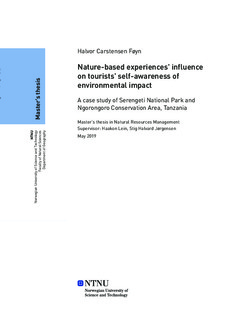| dc.description.abstract | The remaining protected ecosystems in the world are under great pressure from human
exploitation. At the same time, nature-based tourism is the fastest growing segment of the
tourism industry. In this way, nature-based tourism has the potential to play an important role
in connecting people and nature, a connection that can be important for the future of these
areas. Nature-based tourism however, also has the potential to increase human pressure on
these areas in an unsustainable way. Because of the difference between these potential
scenarios, it becomes important to understand the relationship between tourists and nature.
This study contextualizes this relationship by framing it within a management context of
protected areas. The objective is to investigate whether tourism experiences affects tourist’s
perception of their own environmental impact related to nature-based tourism in protected
areas. This will also be used in a discussion of its potential implications for the future
management of these protected areas. A quantitative approach was chosen for the study, and a
tourist survey, using questionnaires, was used to collect the data. This was done in two of the
protected areas in Tanzania, Serengeti National Park and Ngorongoro Conservation Area.
These are both world class icons for nature-based tourism and conservation, and attracts
tourists from all over the world. The study identified five dimensions of the tourism
experience that are affecting the way tourists are perceiving their experience. These
experiences were also argued to influence the tourists understanding of their own
environmental impact on the protected areas. Differences in a tourist’s environmental beliefs
(measured as level of ecocentrism), were found to be especially important for creating
differences between the tourists’ perception of their experience. The implications of the
results are discussed in the context of management of protected areas and has a focus on the
relationship between tourism and conservation. | |
